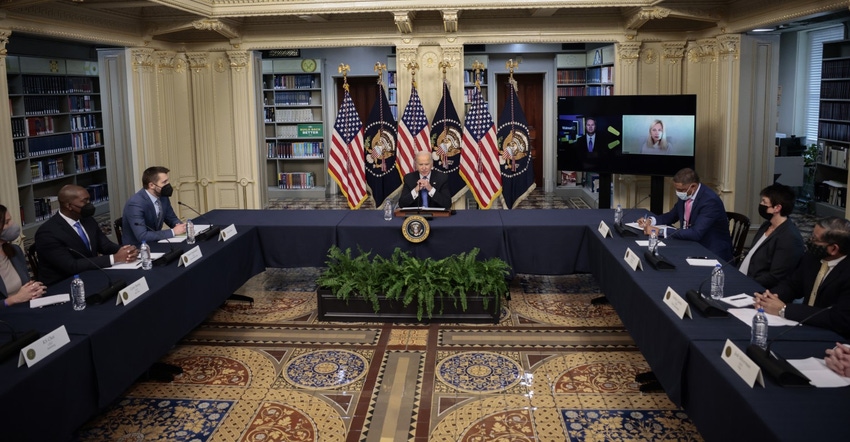
President Joe Biden convened a hybrid in-person and virtual roundtable with CEOs and leaders of major retailers, consumer products firms and grocers on Monday, Nov. 29, following the Thanksgiving holiday weekend. He held the meeting to hear ideas on how the federal government could continue to partner with the private sector to keep shelves stocked for American consumers.
The roundtable also came on the same day the Federal Trade Commission ordered some of those same food supply participants to provide detailed information that will help the FTC shed light on the causes behind ongoing supply chain disruptions and how these disruptions are causing serious and ongoing hardships for consumers and harming competition in the U.S. economy.
During the roundtable, the President’s first line of questioning was directed at Meg Ham, president of the Food Lion with over 1,100 supermarket stores in 10 states. She said first and foremost, “our supply chain is strong and robust.” She said there are ample products inside of their stores, but customers have changed their shopping patterns.
“We worked very early with our vendor partners to get clear on our forecasts for the business and what we could do together, from a logistic standpoint, to ensure they had the supplies they needed, and we had the supplies we needed to get to the customer. So, it was a great collaboration and partnership as we move forward,” Ham shared.
The President asked if there was one food product that was harder to garner compared to others. She said Food Lion strived if a particular brand wasn’t available, to secure another brand. “There wasn’t one particular one; it was focused on being able to provide the special items during this time of year,” she said.
“So, whether it is everyday items or important items during these holiday times around fresh collards, where I'm located, or canned cranberry sauce, we worked very differently to figure out how to move the product, how to work with local farmers to get product directly to our stores to ensure customers had what they needed this holiday season,” she added.
“We had a strong Thanksgiving holiday season and expect that that will continue into the Christmas selling season as well,” Ham added.
Rodney McMullen, Kroger CEO, added, “At Kroger, we feel great about our ability to serve our customers’ needs through the holidays.” Kroger is also partnering with suppliers to plan for increased demand and to increase its safety stock on more than 70 of its most critical categories, leveraging their data insights to identify complementary/substitute items to fill customers’ needs where suppliers can’t meet demands, and diversifying ports of entry Kroger schedules through.
Anticompetitive behavior?
Carlos Castro, Todos Supermarket CEO, represented Todos and America’s independent community grocers during the roundtable discussion on supply chain challenges.
“Although independents are resilient and our customers can rely on us during the holidays, independent grocers unfortunately continue to face competitive disadvantages when sourcing products in short supply. We appreciate the President’s leadership in helping to address the major issues facing retailers and consumers,” Castro said.
The FTC ordered Walmart, Amazon, Kroger and other large wholesalers as well as Tyson Foods Inc. and Kraft Heinz Co. to turn over information to help study causes of empty shelves and sky-high prices. The companies will have 45 days from the date they received the order to respond.
“Supply chain disruptions are upending the provision and delivery of a wide array of goods, ranging from computer chips and medicines to meat and lumber. I am hopeful the FTC’s new 6(b) study will shed light on market conditions and business practices that may have worsened these disruptions or led to asymmetric effects,” said Chair Lina M. Khan. “The FTC has a long history of pursuing market studies to deepen our understanding of economic conditions and business conduct, and we should continue to make nimble and timely use of these information-gathering tools and authorities.”
In addition to better understanding the reasons behind the disruptions, the FTC study will examine whether supply chain disruptions are leading to specific bottlenecks, shortages, anticompetitive practices or contributing to rising consumer prices.
Planning ahead
According to an interview offered by INFORMS, the largest association for the decision and data sciences, Anna Nagurney said food supply chains have been among the most severely disrupted in the pandemic. And 20 months into the pandemic, many issues still remain.
Nagurney, director of Virtual Center for Supernetworks Operations & Information Management at the University of Massachusetts, Amherst, shared, “Challenged food supply chains have had to contend with shortages of labor, escalating transportation costs, congestion issues, extreme weather conditions and various trade policies. On top of that, various supplies needed for packaging are also hard to come by.”
She added some meat and dairy products also are again hard to come by with less variety available for consumers, with prices for meat, including poultry, rising over 10%. Turkeys, for example, in some parts of the country and regions may not be available at the weight desired. Bacon supplies have increase in price, and steel for cans is also hard to come by, she explained.
Nagurney said, “Families this year are expecting to gather in greater numbers than the year before. And there’s clearly excitement surrounding that, so adaptability, solid planning, and early shopping will all be key.”
About the Author(s)
You May Also Like






